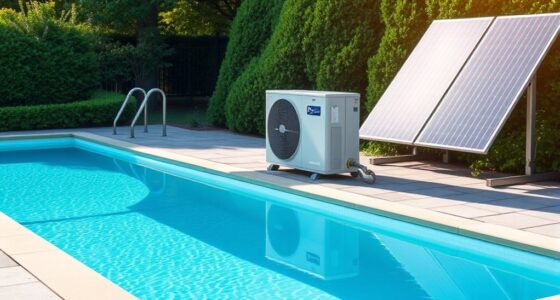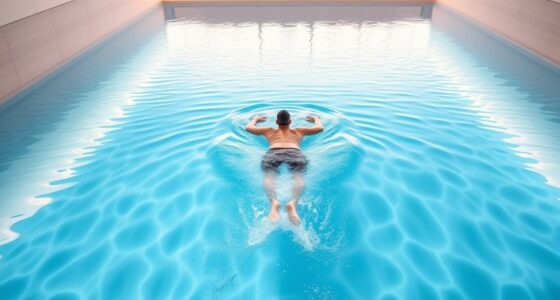To keep your Endless Pool water crystal clear, you should regularly test and balance your water chemistry, maintaining proper pH, chlorine, and alkalinity levels. Make certain your filter runs sufficiently, and clean it often to prevent debris buildup. Use the right chemicals for sanitization, like chlorine or bromine, following the manufacturer’s instructions. Consistent monitoring and adjustment of pH and alkalinity are key. Keep your water pristine by following these steps—you’ll discover even more tips if you continue exploring.
Key Takeaways
- Regularly test and balance water chemistry, especially pH and chlorine levels, to prevent cloudiness and algae growth.
- Ensure proper filtration and circulation by running the pump 8-12 hours daily and cleaning filters regularly.
- Skim the pool surface and clean filters weekly to remove debris and maintain water clarity.
- Use appropriate sanitizers, stabilizers, and algaecides following manufacturer instructions for effective disinfection.
- Monitor and adjust pH and alkalinity levels weekly to keep water balanced and prevent issues.
Regularly Test and Balance Your Water Chemistry

To keep your pool water safe and clear, you need to regularly test and balance its chemistry. Use a reliable test kit or strips to check pH, chlorine levels, alkalinity, and stabilizer. Aim for a pH between 7.2 and 7.6 to prevent irritation and maintain effectiveness of sanitizers. Keep chlorine levels between 1 and 3 ppm to kill bacteria and algae. If pH is too high, add pH reducers; if too low, use pH increasers. Adjust alkalinity to stabilize pH and prevent fluctuations. Regular testing helps you catch imbalances early, avoiding cloudy water, algae growth, and corrosion. Staying on top of your water chemistry ensures your pool remains inviting, safe, and crystal clear. Proper Kia Tuning modifications can also improve overall vehicle handling and performance. Make testing part of your weekly routine for best results.
Maintain Proper Filtration and Circulation

Regularly testing and balancing your pool water chemistry is vital, but it’s equally important to guarantee proper filtration and circulation. Good circulation ensures chemicals are evenly distributed and debris is moved to the filter. To maintain this, check that your pump runs long enough each day—usually at least 8-12 hours. Keep the flow rate appropriate for your pool size, and avoid dead spots where water stagnates. Make sure your skimmers and return jets are unobstructed. Additionally, verify that your filter is functioning correctly and clean it regularly. Proper circulation prevents algae growth, cloudy water, and debris buildup, keeping your pool crystal clear and safe for swimming.
Proper circulation keeps your pool clean, clear, and safe by evenly distributing chemicals and preventing stagnation.
- Run your pump consistently for best flow
- Keep skimmers and jets unobstructed
- Adjust flow rate based on pool size
- Regularly inspect pump and filter operation
- Avoid stagnant areas in the pool
Clean Your Pool and Filters Frequently

Cleaning your pool and filters frequently guarantees your water stays clear and safe. Regularly skim the surface to remove leaves, insects, and debris before they sink and cause cloudiness. Check and clean your filters as recommended by the manufacturer, usually weekly, to prevent buildup that reduces filtration efficiency. Dirty filters can circulate contaminants, leading to cloudy water and potential health issues. Use a garden hose or filter cleaner to rinse out debris from cartridge filters or backwash sand filters properly. Don’t forget to inspect your pool’s skimmer basket and pump strainer for debris, removing any blockages. Proper filtration is essential for maintaining water clarity and ensuring your endless pool remains inviting. Consistent cleaning ensures the filtration system works reliably, keeps water free of contaminants, and maintains that crystal-clear appearance you want for your endless pool.
Use the Right Chemicals for Sanitization

Using the right chemicals for sanitization is essential to keep your pool water safe and balanced. Proper chemicals prevent bacteria, algae, and contaminants from thriving, ensuring clear, healthy water. Start with sanitizers like chlorine or bromine, which kill germs effectively. Regularly test your water to confirm sanitizer levels stay within recommended ranges. You’ll also want to add stabilizers, pH adjusters, and algaecides when needed. Keep these tips in mind:
- Use chlorine or bromine as your primary sanitizer
- Add stabilizers to protect against UV degradation
- Maintain appropriate sanitizer levels with regular testing
- Use algaecides to prevent algae blooms
- Follow manufacturer instructions for accurate dosing
Sticking to these guidelines helps keep your pool water pristine and inviting.
Monitor and Adjust Ph and Alkalinity Levels

Monitoring and adjusting pH and alkalinity levels is essential for maintaining healthy pool water. When pH is too high or low, it can cause cloudiness, scaling, and irritation. Alkalinity acts as a buffer, stabilizing pH fluctuations. You should test your pool water weekly using reliable test kits. If the pH exceeds 7.6, add a pH reducer like muriatic acid or sodium bisulfate. If it drops below 7.2, use a pH increaser such as sodium carbonate. For alkalinity, aim for 80-120 ppm. If it’s too low, add alkalinity increaser; if too high, reduce it gradually with acid. Regular testing and adjustments keep your water balanced, preventing problems, and ensuring a crystal-clear, safe swimming environment. Incorporating proper water chemistry management can also help reduce waterborne contaminants and promote a healthier swimming experience.
Frequently Asked Questions
How Often Should I Replace My Pool’s Water for Optimal Clarity?
You should replace your pool’s water every 3 to 5 years for ideal clarity. Regularly test and balance your water chemistry, keep the filtration system clean, and run it daily to prevent buildup of contaminants. If you notice persistent cloudiness or odors, consider replacing the water sooner. Consistent maintenance ensures your pool stays clear, inviting, and safe for swimming, saving you time and effort in the long run.
What Are the Signs of Chemical Imbalance Beyond Testing Kits?
You notice your water looks cloudy or has a strong chemical smell, which signals an imbalance. For example, a pool owner once ignored a persistent chlorine odor and found their water murky the next day. These signs show your chemicals aren’t working correctly, and you should test your water immediately. Keep an eye out for algae growth or skin irritation, as these also indicate chemical issues needing prompt adjustment.
Can Natural or Organic Products Help Maintain Water Clarity?
Yes, natural and organic products can help maintain water clarity. You can add enzyme-based treatments to break down organic matter and reduce cloudiness. Using mineral purifiers can also improve water quality without harsh chemicals. Regularly use natural algaecides, like copper or silver-based options, to prevent algae growth. Be sure to maintain proper filtration and circulation, and keep organic debris out of your pool to support clear, healthy water naturally.
How Does Weather Affect Water Quality and Clarity?
Weather considerably impacts your pool’s water quality and clarity. Rain introduces dirt, debris, and pollutants, making the water cloudy and increasing chemical needs. Wind can blow leaves and dust into your pool, requiring extra filtration and skimming. Hot, sunny days promote algae growth, while cold weather slows down chemical reactions. To keep your water clear, you should regularly test and adjust chemicals, run your filter more often during adverse weather, and remove debris promptly.
Are There Eco-Friendly Options for Pool Sanitation and Maintenance?
Yes, you can choose eco-friendly options for pool sanitation and maintenance. Use mineral or salt-based systems that reduce or eliminate harsh chemicals, making water safer and more environmentally friendly. Regularly skim debris and use natural enzymes to break down organic matter. Cover your pool when not in use to minimize evaporation and contamination. These practices help keep your pool clean, clear, and eco-conscious without harming the environment or your health.
Conclusion
So, there you have it—your secret weapon to crystal-clear endless pool water. Follow these steps, and you’ll be swimming in perfection, not algae soup. Who knew keeping a pool this pristine could be so easy? Just don’t forget: neglect your chemicals, and you’ll be back to swamp status faster than you can say “chlorine shortage.” So, stay vigilant, stay clean, and enjoy your endless pool like the luxurious oasis it’s meant to be.










